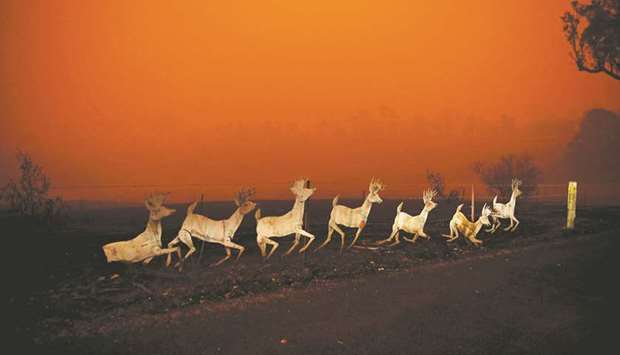Australian authorities began assessing the damage yesterday from heatwave-spurred bushfires that swept through two states a day earlier, as cooler conditions provided a temporary respite from blazes that have scarred the country’s east coast for weeks.
Light rain and cooler temperatures in the southeast of the country were a welcome change from the searing heat that has fuelled the devastating fires, but officials warned they were not enough to put out almost 200 fires still burning.
“It certainly is a welcome reprieve, it is psychological relief if nothing else,” New South Wales (NSW) state Rural Fire Service Commissioner Shane Fitzsimmons said in an afternoon briefing on the situation. “But unfortunately it is not putting out the fires.”
Tens of thousands of homes in both NSW and Victoria states were without power yesterday as a large-scale military and police effort continued to provide supplies and evacuate thousands of people who have been trapped for days in coastal towns by the fires.
Initial estimates put damaged or destroyed properties in the hundreds, but authorities said the mass evacuations by residents of at-risk areas appear to have prevented major loss of life. Twenty-four people have been killed since the start of this year’s wildfire season.
Fire officials said temperatures were expected to rise again during the week and the next major flashpoint would come by Thursday, but it was too early to gauge the likely severity of the threat.
“The weather activity we’re seeing, the extent and spread of the fires, the speed at which they’re going, the way in which they are attacking communities who have never ever seen fire before is unprecedented,” NSW Premier Gladys Berejiklian said.
Thousands of people have been evacuated from coastal towns at the peak of the summer holiday season, in one of the biggest co-ordinated operations since the evacuation of Darwin after Cyclone Tracy flattened the northern city in 1974.
Australia has been battling blazes across much of its east coast for months, with experts saying climate change has been a major factor in a three-year drought that has left much of the country’s bushland tinder-dry and susceptible to fires. Following are highlights of what is happening across Australia:
n Prime Minister Scott Morrison said Singapore and Papua New Guinea have made offers of military support; New Zealand was sending an additional three Air Force helicopters and crews, two Army Combat Engineer Sections and a command element to support Australian Defence efforts.
n As smoke cleared, about 350 people were due to be airlifted out of the Victorian town of Mallacoota yesterday, where around 1,000 people were evacuated by sea on Friday. That would leave about 400 people who had chosen to stay in the community, The Age newspaper reported.
n No fires were burning out of control in the New South Wales, but four fires in Victoria had Evacuate Now or Emergency Level warnings.
n A threat earlier on yesterday to the NSW town of Eden had eased by late afternoon, and authorities said evacuation was no longer necessary.
n Haze from the fires was turning skies orange as far away as New Zealand; police there asked people to not call the emergency phone number.
n In Canberra, officials asked for 100,000 extra breathing masks from the national stockpile as the country’s capital recorded the worst air quality in the world yesterday, according to the IQAir AirVisual global index. The masks are expected to arrive today.
n Actors, popstars and Britain’s royal family stepped in to offer support for victims of the fires, helping to raise millions for firefighting services and wildlife shelters.
n The death of a 47-year old man who was defending a friend’s rural property in NSW took the national toll this season to 24. NSW Premier Berejiklian said there was no one unaccounted for in NSW; Victorian authorities said four people were unaccounted for in Victoria.
n The federal government on Saturday announced an unprecedented call up of army reservists to support firefighters as well other resources including a third navy ship equipped for disaster and humanitarian relief. It also announced the creation of a federal bushfires response agency.
n RFS Commissioner Fitzsimmons criticised the government for not informing him of its policy proposal, saying he found out about it from the media and it created confusion on one of the busiest days ever for fighting fires.
n PM Morrison also faced criticism for a video he posted on social media outlining how the government is tackling the fires. Morrison has been under sustained attack handling of the crisis after he jetted out for a family holiday in Hawaii.
He apologised and returned early but was heckled and snubbed when he toured fire-hit regions in recent days.
n More than 5.25mn hectares (13mn acres) of land has been burnt this fire season. Almost 1,500 homes have been destroyed in NSW state alone.

Christmas decorations are seen nearby a destroyed house in Cobargo, in New South Wales.
